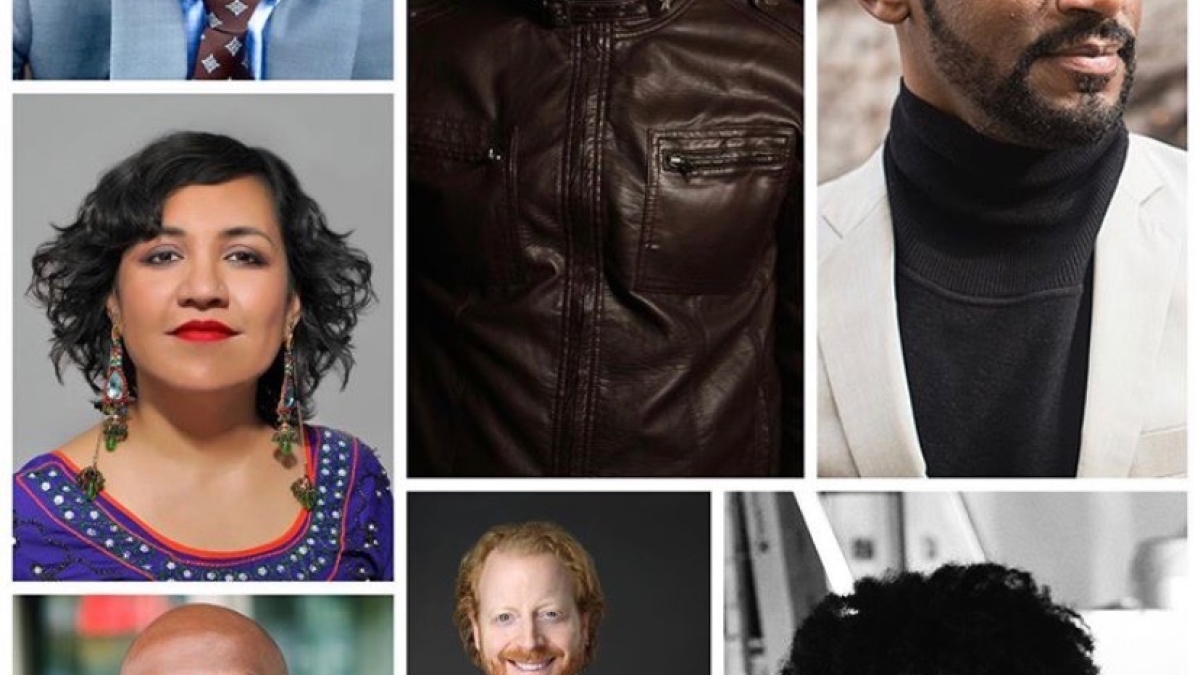'Towards a More Perfect Union' at ASU Gammage brings a new perspective to social change

Joel Thompson, Martha Gonzalez, Marc Bamuthi Joseph, Daniel Bernard Roumain, Jeffery Meyer, Carlos Simon and Tamar-kali. (Not pictured: Joan Tower.)
A protest of social injustice and an opportunity for change: ASU Symphony Orchestra in collaboration with ASU Gammage is redesigning the classic orchestral concert.
“Towards a More Perfect Union” will debut its first and only show on Oct. 5 at ASU Gammage. The show follows seven unique composers through their personal journeys with the challenges of our time, backed with music from ASU students in the School of Music.
Daniel Bernard Roumain is an ASU professor of practice, institute professor, composer and co-director of “Towards a More Perfect Union.” He said this performance is intended to make the audience take a step back and reevaluate the perspective they have on society.
“I hope (the audience) has a new sensitivity and empathy towards people of color,” Roumain said. “I would like them to think of this as a challenge in a way that is engaging and to continue the conversation and dialogue.”
Works by Tamar-kali (composer for Academy Award nominee "Mudbound"), Roumain ("We Shall Not Be Moved," a New York Times top 10 classical new works), Joel Thompson (ASU Projecting All Voices Fellow), Carlos Simon (Sundance/Time Warner Composer Fellow), Grammy winners Joan Tower and Martha Gonzalez and renowned spoken-word artist Marc Bamuthi Joseph.
Jeffery Meyer, co-director for "Towards a More Perfect Union" and associate music professor at ASU, said the conversation for this new style of concert began around two years ago.
Meyer said when he first met Roumain, he was immediately interested in his style of work.
“(Roumain) has a very interesting career, and I wanted to know how I could get the orchestra involved,” Meyer said.
ASU Symphonic Orchestra students rehearse music for "Towards a More Perfect Union."
The seven featured artists came together quite organically, Roumain said.
“All of their works are quite original,” Roumain said. “I know their music and their work really well and thought they would make a really good fit for our students here and orchestra here.”
Roumain said he thinks this will be a unique opportunity for people in Tempe and the Phoenix area to explore these questions that are often not discussed.
“There has been great backlash against people of color and immigrants in the United States, and this concert is not an answer to that, but a deep look into the diversity that forms our society,” Meyer said.
The show will involve music, spoken word, film and other multidisciplinary forms of art.
“There is something that music does to people that words cannot do that brings us together,” Meyer said. “So if there is a message of unity and understanding, this is a powerful medium to create some sense of understanding and some sense of unity and love.”
Student tickets are $10; purchase all other tickets for $20.
More Arts, humanities and education

ASU instructor’s debut novel becomes a bestseller on Amazon
Desiree Prieto Groft’s newly released novel "Girl, Unemployed" focuses on women and work — a subject close to Groft’s heart.“I…

‘It all started at ASU’: Football player, theater alum makes the big screen
For filmmaker Ben Fritz, everything is about connection, relationships and overcoming expectations. “It’s about seeing…

Lost languages mean lost cultures
By Alyssa Arns and Kristen LaRue-SandlerWhat if your language disappeared?Over the span of human existence, civilizations have…


